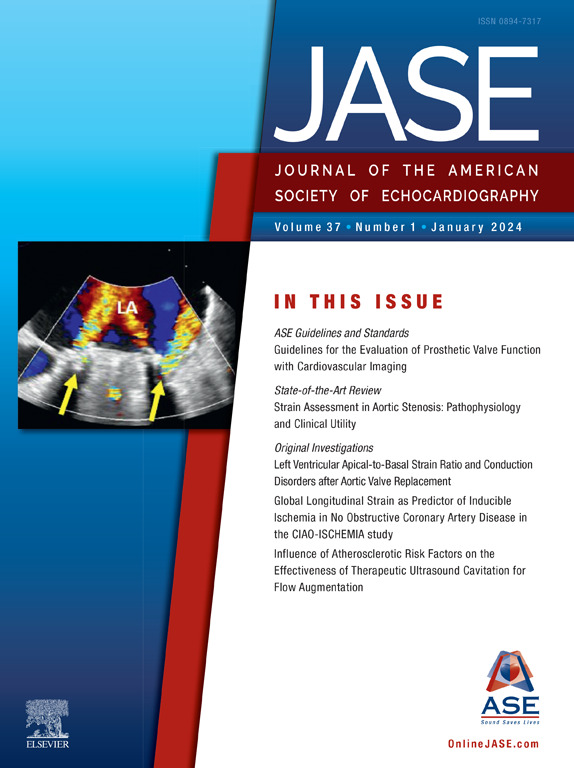Left Ventricular Elastance With Resting Volumetric Transthoracic Echocardiography Identifies Different Phenotypes in Heart Failure With Preserved Ejection Fraction: A Retrospective Analysis of a Multicenter Prospective Observational Study
IF 5.4
2区 医学
Q1 CARDIAC & CARDIOVASCULAR SYSTEMS
Journal of the American Society of Echocardiography
Pub Date : 2025-05-01
DOI:10.1016/j.echo.2024.12.012
引用次数: 0
Abstract
Background
Heart failure with preserved ejection fraction (HFpEF) is a heterogeneous entity including different phenotypes of near normal, normal, and supernormal left ventricular (LV) function. The aim of this study was to assess the value of resting LV elastance (also known as force) using transthoracic echocardiography to identify HFpEF phenotypes.
Methods
In a prospective, observational, multicenter study, 2,380 patients with HFpEF were recruited from July 2016 to May 2024. Systolic blood pressure (SBP) was measured. LV end-diastolic volume (LVEDV), LV end-systolic volume (LVESV), LV ejection fraction, force (SBP/LVESV), stroke volume (SV), arterial elastance, ventricular-arterial coupling, and left atrial volume index were assessed. Global longitudinal strain was available in 1,164 patients (48.9%). Six hundred eighty patients finished follow-up with a composite endpoint of major adverse cardiac events (MACEs). Patients were divided into three groups: group 1, low force (<25th percentile, <3.24 mm Hg/mL); group 2, intermediate force (≥25th percentile and ≤75th percentile, 3.24-5.48 mm Hg/mL); and group 3, high force (>75th percentile, >5.48 mmHg/mL).
Results
The three groups showed a gradient with descending values (group 3 > group 2 > group 1) for SBP, LV ejection fraction, global longitudinal strain, arterial elastance, and ventricular-arterial coupling, with the opposite gradient (group 1 > group 2 > group 3) for LVEDV, LVESV, SV, and left atrial volume index values (P < .01 for all). After a median follow-up period of 16 months, 205 MACEs occurred in 138 patients. The cumulative MACE rate was lowest in group 2 (14.7% person-years) and higher in groups 1 (16.1% person-years) and 3 (22.9% person-years; log-rank P = .036).
Conclusions
Patients with HFpEF present with different LV contractile phenotypes, easily identified with resting LV force and volumetric transthoracic echocardiography. The dominant hemodynamic feature of hypocontractile phenotype is a preload recruitment with larger LVEDV and normal SV, while the hypercontractile phenotype is characterized by a small left ventricle with reduced SV. The hypercontractile and hypocontractile phenotypes are associated with a higher risk for subsequent events.
静息容积经胸超声心动图左心室弹性识别保留射血分数的心力衰竭的不同表型:一项多中心前瞻性观察研究的回顾性分析。
背景:保留射血分数的心力衰竭(HFpEF)是一个异质性实体,包括不同表型的左心室(LV)功能接近正常、正常和超常的患者。目的:通过经胸超声心动图(TTE)评估静息左室弹性(也称为力)对识别HFpEF表型的价值。方法:在一项前瞻性、观察性、多中心研究中,于2016年7月至2024年5月招募了2380例HFpEF患者。测量收缩压(SBP)。我们评估左室舒张末期容积(EDV)、收缩末期容积(ESV)、EF、力(SBP/ESV)、卒中容积(SV)、动脉弹性(AE)、心室-动脉耦合(VAC)和左房容积指数(LAVI)。1164例(48.9%)患者可获得全局纵向应变(GLS)。680例患者以主要不良心脏事件(mace)复合终点完成随访。患者分为三组:低力组(< 25百分位,组1,< 3.24 mmHg/ml),中等力组(≥25百分位,≤75百分位,组2,3.24-5.48 mmHg/ml),高力组(> 75百分位,组3,>5.48 mmHg/ml)。结果:3组患者SBP、EF、GLS、AE、VAC值呈下降梯度(3组> ~ 2>1),EDV、ESV、SV、LAVI值呈相反梯度(1组> ~ 2> 3)(均为p)。结论:HFpEF患者存在不同的左室收缩表型,可通过静息左室力和容积TTE识别。低收缩型的主要血流动力学特征是前负荷增加,伴有较大的左室EDV和正常的SV,而高收缩型的特征是小的左室和减少的SV。过度收缩和低收缩表型与后续事件的高风险相关。
本文章由计算机程序翻译,如有差异,请以英文原文为准。
求助全文
约1分钟内获得全文
求助全文
来源期刊
CiteScore
9.50
自引率
12.30%
发文量
257
审稿时长
66 days
期刊介绍:
The Journal of the American Society of Echocardiography(JASE) brings physicians and sonographers peer-reviewed original investigations and state-of-the-art review articles that cover conventional clinical applications of cardiovascular ultrasound, as well as newer techniques with emerging clinical applications. These include three-dimensional echocardiography, strain and strain rate methods for evaluating cardiac mechanics and interventional applications.

 求助内容:
求助内容: 应助结果提醒方式:
应助结果提醒方式:


